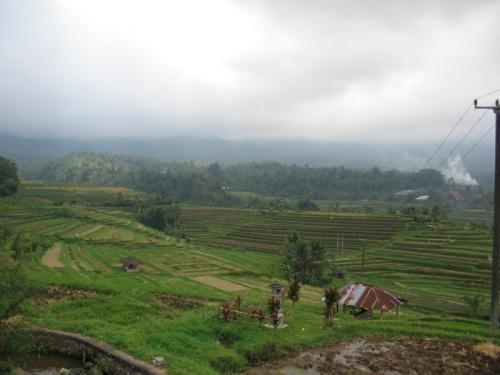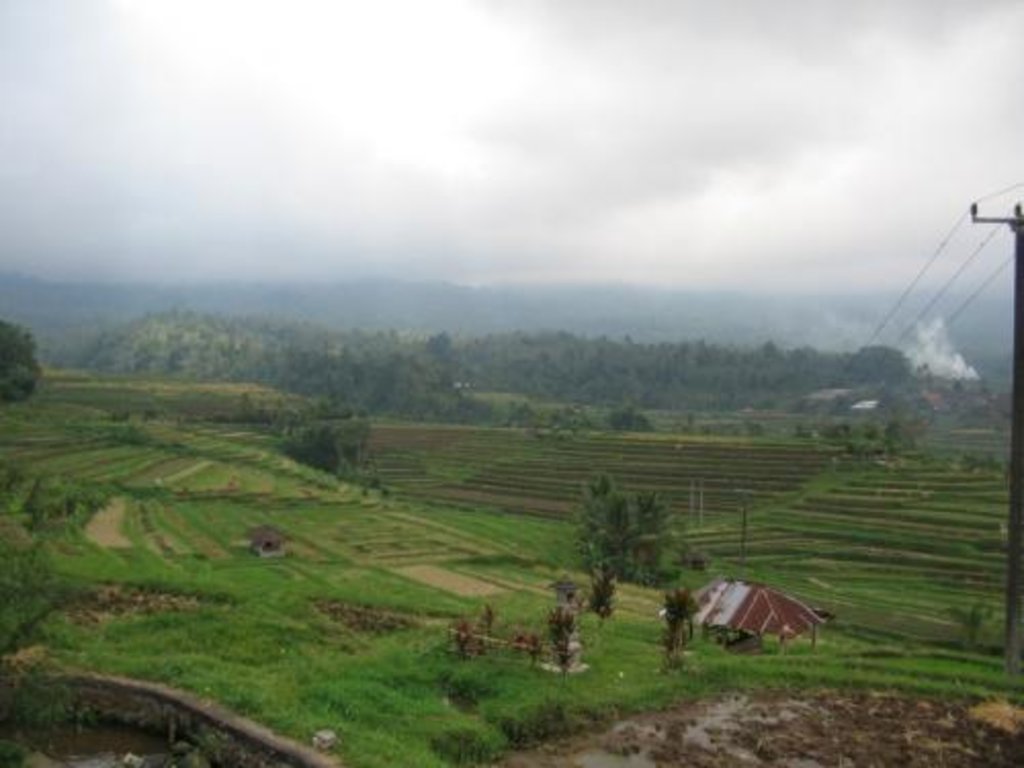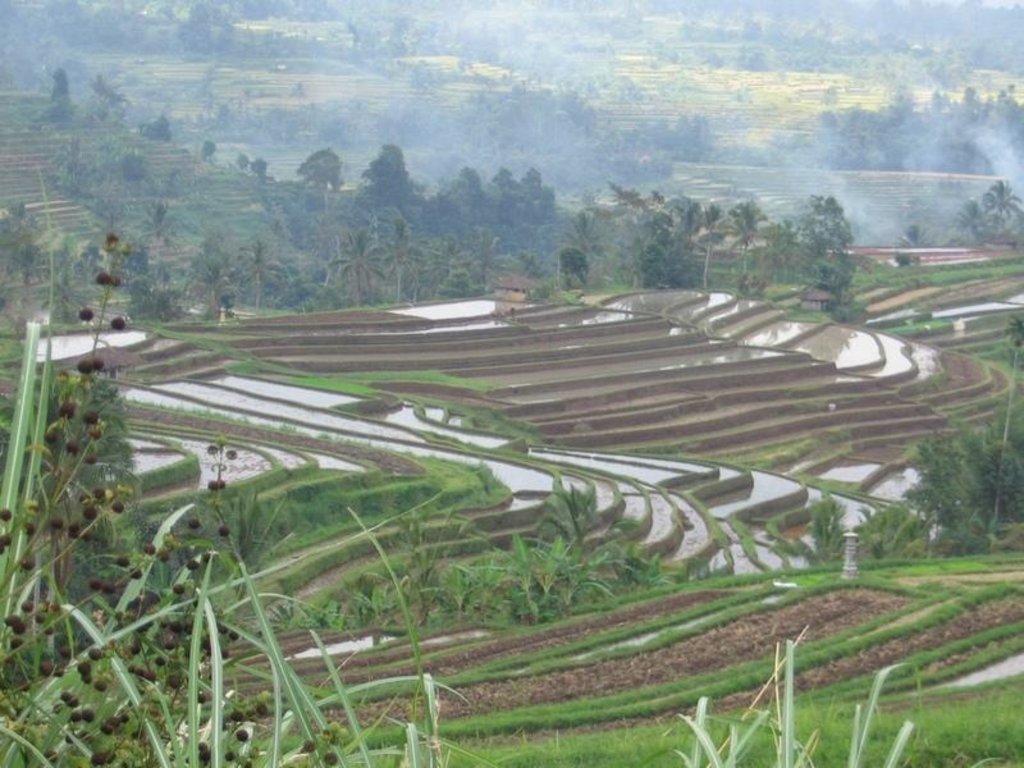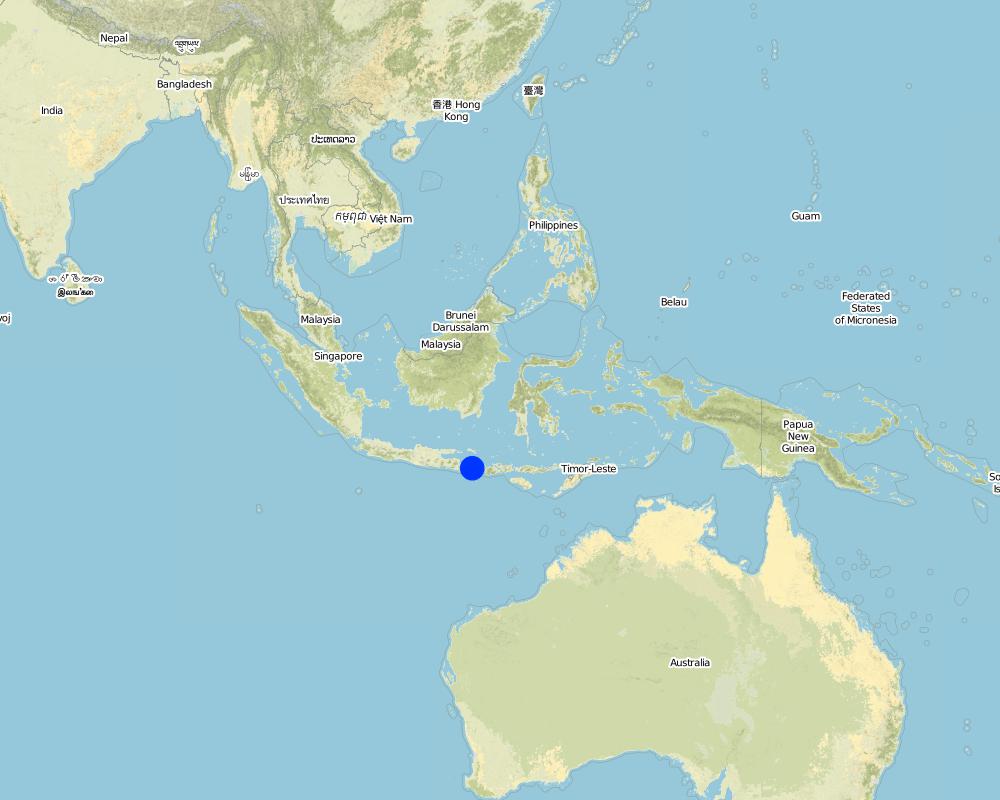Paddy Field Terrace [Indonesia]
- Creation:
- Update:
- Compiler: Lemma Ababu
- Editor: –
- Reviewers: David Streiff, Alexandra Gavilano
Huma
technologies_1082 - Indonesia
View sections
Expand all Collapse all1. General information
1.2 Contact details of resource persons and institutions involved in the assessment and documentation of the Technology
1.3 Conditions regarding the use of data documented through WOCAT
The compiler and key resource person(s) accept the conditions regarding the use of data documented through WOCAT:
Yes
1.5 Reference to Questionnaire(s) on SLM Approaches (documented using WOCAT)

Paddy Field Terrace [Indonesia]
Subak : Organization established by farmers to maintain irrigation systems, paddy field terrace, and irrigation water distribution.
- Compiler: Philippe Zahner
2. Description of the SLM Technology
2.1 Short description of the Technology
Definition of the Technology:
Bench Terrace for Paddy Field
2.2 Detailed description of the Technology
Description:
Combination of conservation technologies. Structure: Bench Terraces, drainage Agronomic : Ridges
2.3 Photos of the Technology
2.5 Country/ region/ locations where the Technology has been applied and which are covered by this assessment
Country:
Indonesia
Region/ State/ Province:
Bali
Specify the spread of the Technology:
- evenly spread over an area
If precise area is not known, indicate approximate area covered:
- 1,000-10,000 km2
Map
×2.6 Date of implementation
If precise year is not known, indicate approximate date:
- more than 50 years ago (traditional)
2.7 Introduction of the Technology
Specify how the Technology was introduced:
- as part of a traditional system (> 50 years)
Comments (type of project, etc.):
Ancestors
3. Classification of the SLM Technology
3.1 Main purpose(s) of the Technology
- reduce, prevent, restore land degradation
3.2 Current land use type(s) where the Technology is applied

Cropland
- Annual cropping
- rice
Number of growing seasons per year:
- 2
Specify:
Longest growing period from month to month: Oct - Mar
Comments:
Major land use problems (compiler’s opinion): Steep slope, High cost, agricultural management
Major land use problems (land users’ perception): High cost management
3.5 SLM group to which the Technology belongs
- cross-slope measure
- irrigation management (incl. water supply, drainage)
3.6 SLM measures comprising the Technology
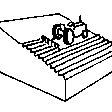
agronomic measures
- A1: Vegetation/ soil cover
- A3: Soil surface treatment
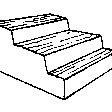
structural measures
- S1: Terraces
Comments:
Type of agronomic measures: mixed cropping / intercropping, contour tillage
3.7 Main types of land degradation addressed by the Technology

soil erosion by water
- Wt: loss of topsoil/ surface erosion
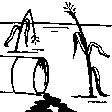
chemical soil deterioration
- Cn: fertility decline and reduced organic matter content (not caused by erosion)
4. Technical specifications, implementation activities, inputs, and costs
4.1 Technical drawing of the Technology
Technical specifications (related to technical drawing):
Technical knowledge required for field staff / advisors: moderate
Technical knowledge required for land users: moderate
Secondary technical functions: control of dispersed runoff: retain / trap, reduction of slope angle
Slope (which determines the spacing indicated above): 35.00%
If the original slope has changed as a result of the Technology, the slope today is (see figure below): 60.00%
Slope (which determines the spacing indicated above): 35%
If the original slope has changed as a result of the Technology, the slope today is: 60%
4.2 General information regarding the calculation of inputs and costs
If relevant, indicate exchange rate from USD to local currency (e.g. 1 USD = 79.9 Brazilian Real): 1 USD =:
8000.0
Indicate average wage cost of hired labour per day:
3.00
4.3 Establishment activities
| Activity | Timing (season) | |
|---|---|---|
| 1. | establishment of terrace | |
| 2. | drainage ditch | |
| 3. | land preparation | |
| 4. | establishment of terrace | |
| 5. | Drainage ditch | |
| 6. | Land preparation |
4.5 Maintenance/ recurrent activities
| Activity | Timing/ frequency | |
|---|---|---|
| 1. | Land preparation | early season / before each season |
| 2. | Planting | |
| 3. | Maintenance | |
| 4. | Harvesting | |
| 5. | drainage maintenance | |
| 6. | terrace rizes maintenance | |
| 7. | drainage maintenance | |
| 8. | Terrace rizer maintenance |
4.7 Most important factors affecting the costs
Describe the most determinate factors affecting the costs:
cost for preparation and terrace maintenance in steep slope is higher than that.
5. Natural and human environment
5.1 Climate
Annual rainfall
- < 250 mm
- 251-500 mm
- 501-750 mm
- 751-1,000 mm
- 1,001-1,500 mm
- 1,501-2,000 mm
- 2,001-3,000 mm
- 3,001-4,000 mm
- > 4,000 mm
Agro-climatic zone
- humid
- sub-humid
5.2 Topography
Slopes on average:
- flat (0-2%)
- gentle (3-5%)
- moderate (6-10%)
- rolling (11-15%)
- hilly (16-30%)
- steep (31-60%)
- very steep (>60%)
Landforms:
- plateau/plains
- ridges
- mountain slopes
- hill slopes
- footslopes
- valley floors
Altitudinal zone:
- 0-100 m a.s.l.
- 101-500 m a.s.l.
- 501-1,000 m a.s.l.
- 1,001-1,500 m a.s.l.
- 1,501-2,000 m a.s.l.
- 2,001-2,500 m a.s.l.
- 2,501-3,000 m a.s.l.
- 3,001-4,000 m a.s.l.
- > 4,000 m a.s.l.
5.3 Soils
Soil depth on average:
- very shallow (0-20 cm)
- shallow (21-50 cm)
- moderately deep (51-80 cm)
- deep (81-120 cm)
- very deep (> 120 cm)
Soil texture (topsoil):
- medium (loamy, silty)
- fine/ heavy (clay)
Topsoil organic matter:
- high (>3%)
- medium (1-3%)
If available, attach full soil description or specify the available information, e.g. soil type, soil PH/ acidity, Cation Exchange Capacity, nitrogen, salinity etc.
Soil fertility is medium - high
Topsoil organic matter: Most of crop residue was incorporated to the soil at the time of ploughing
Soil drainage / infiltration is good - medium
Soil water storage capacity is medium - high
5.6 Characteristics of land users applying the Technology
Off-farm income:
- 10-50% of all income
Relative level of wealth:
- average
- rich
Level of mechanization:
- manual work
- animal traction
Indicate other relevant characteristics of the land users:
Population density: 100-200 persons/km2
Annual population growth: 1% - 2%
Off-farm income specification: income from handy craft
Level of mechanization: When the width of the terrace is wide enough animal traction is possible
6. Impacts and concluding statements
6.4 Cost-benefit analysis
How do the benefits compare with the establishment costs (from land users’ perspective)?
Short-term returns:
very positive
How do the benefits compare with the maintenance/ recurrent costs (from land users' perspective)?
Short-term returns:
slightly positive
6.5 Adoption of the Technology
If available, quantify (no. of households and/ or area covered):
130 households
Of all those who have adopted the Technology, how many did so spontaneously, i.e. without receiving any material incentives/ payments?
- 51-90%
Comments:
50 land user families have adopted the Technology with external material support
Comments on acceptance with external material support: estimates
80 land user families have adopted the Technology without any external material support
Comments on spontaneous adoption: estimates
There is a little trend towards spontaneous adoption of the Technology
7. References and links
7.1 Methods/ sources of information
Links and modules
Expand all Collapse allLinks

Paddy Field Terrace [Indonesia]
Subak : Organization established by farmers to maintain irrigation systems, paddy field terrace, and irrigation water distribution.
- Compiler: Philippe Zahner
Modules
No modules


